新概念一_lesson29课课文
新概念一册二十至三十课的课文

新概念一册二十至三十课的课文新概念一册二十至三十课的课文你知道什么叫做新概念英语吗?你读过新概念英语吗?以下跟着小编带领你来看一下新概念英语20~30课的课文。
Lesson 20: One man in a boat独坐孤舟First listen and then answer the question.听录音,然后回答以下问题.Why is fishing the writer's favourite sport?Fishing is my favourite sport. I often fish for hours without catching anything. But this does not worry me. Some fishermen are unlucky. Instead of catching fish, they catch old boots and rubbish. I am even less lucky. I never catch anything -- not even old boots. After having spent whole mornings on the river, I always go home with an empty bag. 'You must give up fishing!' my friends say. 'It's a waste of time.' But they don't realize one important thing. I'm not really interested in fishing. I am only interested in sitting in a boat and doing nothing at all!New words and expressions 生词和短语catch v. 抓到fisherman n. 钓鱼人,渔民boot n. 靴子waste n. 浪费realize v. 意识到Lesson 21 Mad or not? 是不是疯了First listen and then answer the question.听录音,然后回答以下问题.Why do people think the writer is mad?Aeroplanes are slowly driving me mad. I live near an airport and passing planes can be heard night and day. The airport wasbuilt years ago, but for some reason it could not be used then. Last year, however, it came into use. Over a hundred people must have been driven away from their homes by the noise. I am one of the few people left. Sometimes I think this house will be knocked down by a passing plane. I have been offered a large sum of money to go away, but I am determined to stay here. Everybody says I must be mad and they are probably right.New words and expressions 生词和短语mad adj. 发疯reason n. 原因sum n. 量determined adj. 坚定的,下决心的Lesson 22:A glass envelope 玻璃信封First listen and then answer the question.听录音,然后回答以下问题.How did Jane receive a letter from a stranger?My daughter, Jane, never dreamed of receiving a letter from a girl of her own age in Holland. Last year, we were travelling across the Channel and Jane put a piece of paper with her name and address on it into a bottle. She threw the bottle into the sea. She never thought of it again, but ten months later, she received a letter from a girl in Holland. Both girls write to each other regularly now. However, they have decided to use the post office. Letters will cost a little more, but they will certainly travel faster.New words and expressions 生词和短语dream v. 做梦,梦想age n. 年龄channel n. 海峡throw v. 扔,抛Lesson 23: A new house 新居First listen and then answer the question.听录音,然后回答以下问题.Why is the new house special?I had a letter from my sister yesterday. She lives in Nigeria. In her letter, she said that she would come to England next year. If she comes, she will get a surprise. We are now living in a beautiful new house in the country. Work on it had begun before my sister left. The house was completed five months ago. In my letter, I told her that she could stay with us. The house has many large rooms and there is a lovely garden. It is a very modern house, so it looks strange to some people. It must be the only modern house in the district.New words and expressions 生词和短语complete v. 完成modern adj. 新式的,与以往不同的strange adj. 奇怪的district n. 地区Lesson 24: If could be worse 不幸中之万幸First listen and then answer the question.听录音,然后回答以下问题.Had the writer's money been stolen?I entered the hotel manager's office and sat down. I had just lost $50 and I felt very upset. 'I left the money in my room,' I said, 'and it's not there now.' The manager was sympathetic, but he could do nothing. 'Everyone's losing money these days,' he said. He started to complain about this wicked world but was interrupted by a knock at the door. A girl came in and put an envelope on his desk. It contained $50. 'I found this outside this gentleman's room,' she said. 'Well,' I said to the manager, 'there is still some honesty in this world!'New words and expressions 生词和短语manager n. 经理upset adj. 不安sympathetic adj. 表示同情的complain v. 抱怨wicked adj. 很坏的,邪恶的contain v. 包含,内装honesty n. 诚实Lesson 25:Do the English speak English? 英国人讲的是英语吗?First listen and then answer the question.听录音,然后回答以下问题.Why does the writer not understand the porter?I arrived in London at last. The railway station was big, black and dark. I did not know the way to my hotel, so I asked a porter.I not only spoke English very carefully, but very clearly as well. The porter, however, could not understand me. I repeated my question several times and at last he understood. he answered me, but he spoke neither slowly nor clearly. 'I am a foreigner,' I said. Then he spoke slowly, but I could not understand him. My teacher never spoke English like that! The porter and I looked at each other and smiled. Then he said something and I understood it. 'You'll soon learn English!' he said. I wonder. In England, each person speaks a different language. The English understand each other, but I don't understand them! Do they speak English?New words and expressions 生词和短语railway n. 铁路porter n. 搬运工several quantifier 几个foreigner n. 外国人wonder v. 感到奇怪Lesson 26:The best art critics 最佳艺术评论家First listen and then answer the question.听录音,然后回答以下问题.Who is the student's best critic?I am an art student and I paint a lot of pictures. Many people pretend that they understand modern art. They always tell you what a picture is 'about'. Of course, many pictures are not 'about' anything. They are just pretty patterns. We like them in the same way that we like pretty curtain material. I think that young children often appreciate modern pictures better than anyone else. They notice more. My sister is only seven, but she always tells me whether my pictures are good or not. She came into my room yesterday.'What are you doing?' she asked.'I'm hanging this picture on the wall,' I answered. 'It's a new one. Do you like it?'She looked at it critically for a moment. 'It's all right,' she said, 'but isn't it upside down?'I looked at it again. She was right! It was!New words and expressions 生词和短语art n. 艺术critic n. 评论家paint v. 画pretend v. 假装pattern n. 图案curtain n. 窗帘,幕布material n. 材料appreciate v. 鉴赏notice v. 注意到whether conj. 是否hang v. 悬挂,吊critically adv. 批评地upside down 上下颠倒地Lesson 27:A wet night 雨夜First listen and then answer the question.听录音,然后回答以下问题.What happened to the boys in the night?Late in the afternoon, the boys put up their tent in the middle of a field. As soon as this was done, they cooked a meal over an open fire. They were all hungry and the food smelled good. After a wonderful meal, they told stories and sang songs by the campfire. But some time later it began to rain. The boys felt tired so they put out the fire and crept into their tent. Their sleeping bags were warm and comfortable, so they all slept soundly. In the middle of the night, two boys woke up and began shouting. The tent was full of water! They all leapt out of their sleeping bags and hurried outside. It was raining heavily and they found that a stream had formed in the field. The stream wound its way across the field and then flowed right under their tent!New words and expressions 生词和短语tent n. 帐篷field n. 田地,田野smell v. 闻起来wonderful adj. 极好的campfire n. 营火,篝火creep v. 爬行sleeping bag 睡袋comfortable adj. 舒适的`,安逸的soundly adv. 香甜地leap v. 跳跃,跳起heavily adv. 大量地stream n. 小溪form v. 形成wind v. 蜿蜒right adv. 正好Lesson 28:No parking 禁止停车First listen and then answer the question.听录音,然后回答以下问题.What is Jasper White's problem?Jasper White is one of those rare people who believes in ancient myths. he has just bought a new house in the city, but ever since he moved in, he has had trouble with cars and their owners. When he returns home at night, he always finds that someone has parked a car outside his gate. Because of this, he has not been able to get his own car into his garage even once. Jasper has put up 'No Parking' signs outside his gate, but these have not had any effect. Now he has put an ugly stone head over the gate. It is one of the ugliest faces I have ever seen. I asked him what it was and he told me that it was Medusa, the Gorgon. jasper hopes that she will turn cars and their owners to stone. But none of them has been turned to stone yet!New words and expressions 生词和短语rare adj. 罕见的ancient adj. 古代的,古老的myth n. 神话故事trouble n. 麻烦effect n. 结果,效果Medusa n. 美杜莎(古希腊神话中3位蛇发女怪这一)Gorgon n. (古希腊神话中的)3位蛇发女怪这一(凡见其貌者都会变成石头)Lesson 29:Taxi! 出租汽车First listen and then answer the question.听录音,然后回答以下问题.Does Captain Fawcett think any trip is too dangerous?Captain Ben Fawcett has bought an unusual taxi and has begun a new service. The 'taxi' is a small Swiss aeroplane called a 'Pilatus Porter'. This wonderful plane can carry seven passengers. The most surprising thing about it, however, is that it can land anywhere: on snow, water, or even on a ploughed field. Captain Fawcett's first passenger was a doctor who flew from Birmingham to a lonely village in the Welsh mountains. Since then, Captain Fawcett has flown passengers to many unusual places. Once he landed on the roof of a block of flats and on another occasion, he landed in a deserted car park. Captain Fawcett has just refused a strange request from a businessman. The man wanted to fly to Rockall, a lonely island in the Atlantic Ocean, but Captain Fawcett did not take him because the trip was too dangerous.Lesson 30:Football or polo? 足球还是水球?First listen and then answer the question.听录音,然后回答以下问题.What happened to the man in the boat?The Wayle is a small river that cuts across the park near my home. I like sitting by the Wayle on fine afternoons. It was warm last Sunday, so I went and sat on the river bank as usual. Some children were playing games on the bank and there were some people rowing on the river. Suddenly, one of the children kicked a ball very hard and it went towards a passing boat. Some people on the bank called out to the man in the boat, but he did not hear them. The ball struck him so hard that he nearly fell into thewater. I turned to look at the children, but there weren't any in sight: they had all run away! The man laughed when he realized what had happened. He called out to the children and threw the ball back to the bank.New words and expressions 生词和短语polo n. 水球Wayle n. 威尔(河名)cut v. 穿过row v. 划(船)kick v. 踢towards prep. 朝,向nearly adv. 几乎sight n. 眼界,视域。
新概念英语第一册Lesson2930ComeinAmy小学英语初中英语全国通用
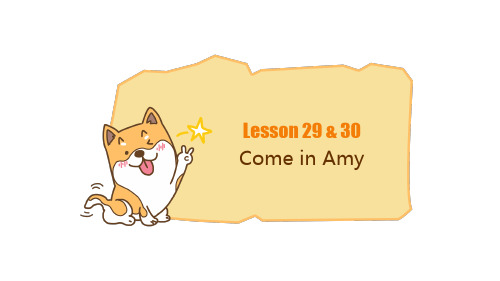
同学们 , 请对照教材听老师讲解! air the room : 给房间通风换气
air : v. 给…通风换气 n. 空气
Language Point
语句讲解、课文讲解
同学们 , 请对照教材听老师讲解!
then : th发 [ð] adv. 然后,接着 e.g. 先买菜,再做晚饭。
open : adj. 开着的 , 营业的
shut : v. 关上
open : v. 打开
e.g. Shut / Open the door. → 祈使句
Language Point
语句讲解、课文讲解
表示礼貌 , 后面加一个逗号 , 然后加please. e.g. Shut the door / window, please. shut作动词时 , 还有一个近义词close e.g. Shut the door / window, please.
做个小练习 巩固一下吧~
"祈使句比较特殊 , 经常省略动作的主语。 ”这种说法对不对?
A. no
B. yes
查看答案解析
答案:yes 解析: 考查祈使句。 祈使句特点: 1.省略主语 2. 直接使用动词原形;
下一题
根据句意填空。 The milk bottle is not clean. _________ it please.
Language Point
语句讲解、课文讲解
empty : adj. 空的 e.g. This bottle is empty. empty : v. 把… 倒空 e.g. Empty the bottle / box.
an empty bottle
有形容词,同时含有动词含义的词 : clean, shut, open, empty e.g. The cup isn't empty. Empty it!
新概念英语第1册课文+译文
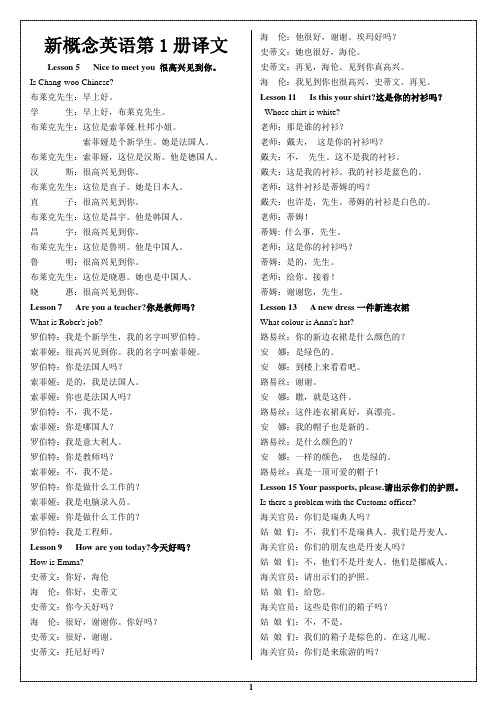
新概念英语第1册译文Lesson 5 Nice to meet you 很高兴见到你。
Is Chang-woo Chinese?布莱克先生:早上好。
学生:早上好,布莱克先生。
布莱克先生:这位是索菲娅.杜邦小姐。
索菲娅是个新学生。
她是法国人。
布莱克先生:索菲娅,这位是汉斯。
他是德国人。
汉斯:很高兴见到你。
布莱克先生:这位是直子。
她是日本人。
直子:很高兴见到你。
布莱克先生:这位是昌宇。
他是韩国人。
昌宇:很高兴见到你。
布莱克先生:这位是鲁明。
他是中国人。
鲁明:很高兴见到你。
布莱克先生:这位是晓惠。
她也是中国人。
晓惠:很高兴见到你。
Lesson 7 Are you a teacher?你是教师吗?What is Rober's job?罗伯特:我是个新学生,我的名字叫罗伯特。
索菲娅:很高兴见到你。
我的名字叫索菲娅。
罗伯特:你是法国人吗?索菲娅:是的,我是法国人。
索菲娅:你也是法国人吗?罗伯特:不,我不是。
索菲娅:你是哪国人?罗伯特:我是意大利人。
罗伯特:你是教师吗?索菲娅:不,我不是。
罗伯特:你是做什么工作的?索菲娅:我是电脑录入员。
索菲娅:你是做什么工作的?罗伯特:我是工程师。
Lesson 9 How are you today?今天好吗?How is Emma?史蒂文:你好,海伦海伦:你好,史蒂文史蒂文:你今天好吗?海伦:很好,谢谢你。
你好吗?史蒂文:很好,谢谢。
史蒂文:托尼好吗?海伦:他很好,谢谢。
埃玛好吗?史蒂文:她也很好,海伦。
史蒂文:再见,海伦。
见到你真高兴。
海伦:我见到你也很高兴,史蒂文。
再见。
Lesson 11 Is this your shirt?这是你的衬衫吗?Whose shirt is white?老师:那是谁的衬衫?老师:戴夫,这是你的衬衫吗?戴夫:不,先生。
这不是我的衬衫。
戴夫:这是我的衬衫。
我的衬衫是蓝色的。
老师:这件衬衫是蒂姆的吗?戴夫:也许是,先生。
蒂姆的衬衫是白色的。
新概念英语第一册课文17-29
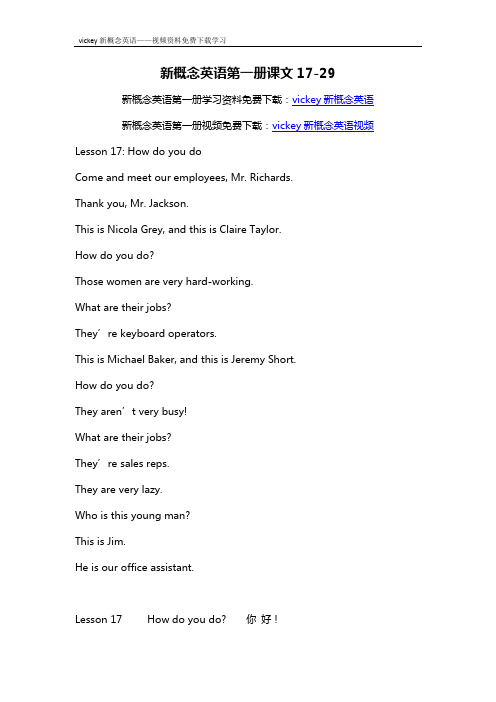
新概念英语第一册课文17-29新概念英语第一册学习资料免费下载:vickey新概念英语新概念英语第一册视频免费下载:vickey新概念英语视频Lesson 17: How do you doCome and meet our employees, Mr. Richards.Thank you, Mr. Jackson.This is Nicola Grey, and this is Claire Taylor.How do you do?Those women are very hard-working.What are their jobs?They’re keyboard operators.This is Michael Baker, and this is Jeremy Short.How do you do?They aren’t very busy!What are their jobs?They’re sales reps.They are very lazy.Who is this young man?This is Jim.He is our office assistant.Lesson 17 How do you do? 你好!杰克逊先生:来见见我们的雇员,理查兹先生。
理查兹先生:谢谢,杰在逊先生。
杰克逊先生:这位是尼克拉.格雷,这位是克莱尔.泰勒。
理查兹先生:你们好!理查兹先生:那些姑娘很勤快。
她们是做什么工作的?杰克逊先生:她们是电脑录入员。
杰克逊先生:这位是迈克尔.贝克,这位是杰里米.肖特。
理查兹先生:你们好!理查兹先生:他们不很忙吧!他们是做什么工作的?杰克逊先生:他们是推销员,他们非常懒。
理查兹先生:这个年轻人是谁?杰克逊先生:他是吉姆,是我们办公室的勤杂人员。
Lesson 19: Tired and thirstyWhat’s the mater, children?We are tired and thirsty, Mum.Sit down here.Are you all right now?No, we aren’t.Look!There’s an ice cream man.Two ice creams please.Here you are, children.Thanks, Mum.There ice creams are nice.Are you all right now?Yes, we are, thank you.Lesson 19 Tired and thirsty 又累又渴母亲:怎么啦,孩子们?女孩:我们累了……男孩:……口也渴,妈妈。
新概念英语第一册第29-30课课件

二、Key grammar
must 必须,一定
1.情态动词,后接动词原形。 2.其他情态动词can, should, may,need等。 3. 陈述句(肯定式+否定式)、疑问句(一般 +特殊)
陈述句:
--I must go to work every day.(肯定式)
-You must not/ mustn't go to work every day.
put on
穿上
take off 脱掉
turn on / off 开/关 (电灯)
12
二、Example:
Put on your coat. 穿上你的外套。 Take off your coat. 脱下你的外套。
Turn on the light. 打开灯。 Turn off the light. 关上灯。
(否定式)
5
疑问句: -- Must I go to work every day?(一般疑问句) --Yes, you must!/ No, you needn’t!
--What must I do?(特殊疑问句)
特殊疑问词: what, where, when, which, why, how
knives!
15
练习册P34
16
部分资料从网络收集整 理而来,供大家参考,
感谢您的关注!
特殊疑问词+情态动词+主语+动原形(特殊)
▪ 陈述句: 主语+情态动词+动原形(肯定形式/否定形式)
9
Lesson 30 What must I do?
我应该做什么?
10
▪
本课纲领
新概念英语第一册课文及翻译

新概念英语第一册Lesson1: Excuse me!Excuse me!Yes?Is this your handbag?Pardon?Is this your handbag?Yes, it is.Thank you very much.对不起什么事?这是您的手提包吗?对不起,请再说一遍。
这是您的手提包吗?是的,是我的。
非常感谢!Lesson 3:Sorry sir.My coat and my umbrella please. Here is my ticket.Thank you sir.Number five.Here is your umbrella and your coat. This is not my umbrella.Sorry sir.Is this your umbrella?No, it isn't.Is this it?Yes, it is.Thank you very much.请把我的大衣和伞拿给我。
这是我(寄存东西)的牌子。
谢谢,先生。
是5号。
这是您的伞和大衣这不是我的伞。
对不起,先生。
这把伞是您的吗?不,不是!这把是吗?是,是这把非常感谢。
Lesson 5: Nice to meet you.Good morning.Good morning, Mr. Blake.This is Miss Sophie Dupont.Sophie is a new student.She is a French.Sophie, this is Hans.He is German.Nice to meet you.And this is Naoko.She’s Japanese.Nice to meet you.And this is Chang-woo.He’s Korean.Nice to meet you.And this is Luming.He’s Chinese.Nice to meet you.And this is Xiaohui.She’s Chinese, too.Nice to meet you.布莱克先生:早上好。
新概念英语Lesson29-30(共8页)课件

the wardrobe. • MRS. JONES: Then make the bed. • MRS. JONES: Dust the dressing table.
课文解析
• e in ,Amy. 进来,艾米! • ★祈使句:省略了主语“you”动词用原
形。 • 用来表示直接的命令,建议,告戒或邀请
等多种意图。 • e.g.: Stand up! • Sit down! • Give me some glasses,please. • Harry up ,shut the door! • Open the window and air the room. • Go away!
• 该句仍为祈使句。 • put sth. Somehwhere句型 • put the apple in my bag • put money in my bag • put the stone in your bag • put the computer in my room • put the T.V. in my room • put the dust bin in your room
• 2.What must I do? 我必须做些什么呢? • 这是本课所学的含有情态动词的特殊疑问
句。 • 其结构为:特殊疑问词+情态动词+主语+
谓语?
• What must I do?
• What must he do?
• What must they do?
• 3.Then put these clothes in the wardrobe. 然后把这些衣服放在衣柜里。
新概念英语第一册第29课
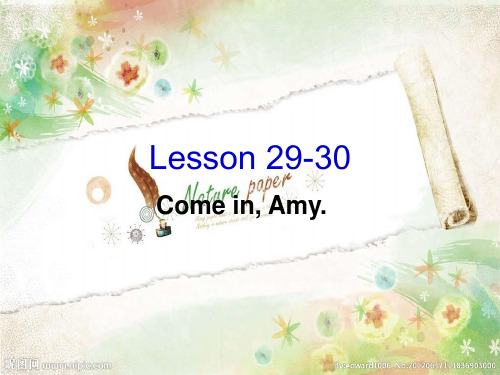
come in shut the door… open the window… air the room… make the bed… dust the dressing table… sweep the floor… put on/take off your clothes… turn on/turn off the stereo… empty the cup… read the magazine… sharpen the knife…
★untidy adj. 乱,不整齐 un-前缀,表示否定;tity adj. 整齐的,干净的 happy——unhappy 不幸福的 lucky——unlucky 不幸的 known——unknown 未知的 ★air v. 使 … 通风,换换空气 ① n. 空气,新鲜空气 Let’s go out and breathe some fresh air. ② n. 空中,空间 He likes to stay in the open air. 他喜欢在户外呆着。 ③ v. 晾(衣服、被褥等);使通风 Leave the trousers on the washing-line to air. 把裤子挂到晾衣绳上去晾干。 ★dust v. 掸掉灰尘土 dust ① v. 掸掉……上的灰尘;② n. 灰尘
衣柜
卧室 关门
打开
使…通风
Hale Waihona Puke 打扫灰尘衣服 不整齐情态动词must的用法: must是情态动词,表示“必须”、“应当” 。 1 情态动词表示人的情感、状态或情绪变化的一种 助动词。 2 情态动词不能单独做谓语,只能和后面的原形动 词一起构成谓语。 3 情态动词没有人称和数格的变化。 4 含有情态动词的句子,否定句在它后面加not, 一般疑问句把它提前。 You must open the window. You mustn't open the window? Must I open the window? Yes, you must. No, you needn't.
(完整版)新概念英语第一册课文word版(按课分页建议四合一打印)(可编辑修改word版)
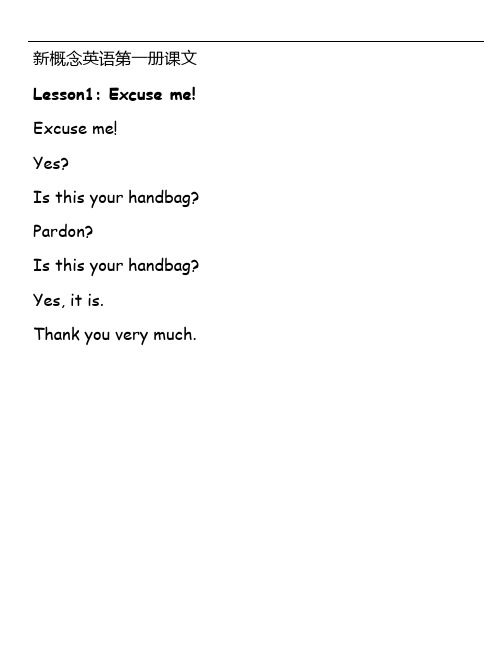
新概念英语第一册课文Lesson1: Excuse me! Excuse me!Yes?Is this your handbag? Pardon?Is this your handbag? Yes, it is.Thank you very much.Lesson 3:Sorry sir.My coat and my umbrella please. Here is my ticket.Thank you sir.Number five.Here is your umbrella and your coat. This is not my umbrella.Sorry sir.Is this your umbrella?No, it isn't.Is this it?Yes, it is.Thank you very much.Lesson 5: Nice to meet you.Good morning.Good morning, Mr. Blake.This is Miss Sophie Dupont. Sophie is a new student. She is a French.Sophie, this is Hans.He is German.Nice to meet you.And this is Naoko. She’s Japanese.Nice to meet you.And this is Chang-woo. He’s Korean.Nice to meet you.And this is Luming.He’s Chinese.Nice to meet you.And this is Xiaohui. She’s Chinese, too.Nice to meet you.Lesson 7: Are you a teacher? I’m a new student.My name’s Robert.Nice to meet you.My name’s Sophie.Are you French?Yes, I’m.Are you French, too?No, I’m not.What nationality are you?I’m Italian.Are you a teacher?No, I’m not.What’s your job?I’m a keyboard operator. What’s your job?I’m an engineer.Lesson 9: How are you today? Hello, Helen.Hi, Steven.How are you today?I’m very well, Thank you.And you?I’m fine, thanks.How is Tony?He’s fine, Thanks.How’s Emma?She’s very well, too, Helen. Goodbye, Helen.Nice to see you.Nice to see you, too, Steven. Goodbye.Lesson 11: Is this your shirt? Whose shirt is that?Is this your shirt, Dave? No, sir.It’s not my shirt.This is my shirt.My shirts blue.Is this shirt Tim’s?Perhaps it is, sir.Tim’s shirts white.Tim!Yes, sir.Is this your shirt?Yes, Sir.Here you are.Catch.Thank you, sir.Lesson 13: A new dress What color is your new dress? It is green.Come upstairs and see it. Thanks you.Look!Here it is!That’s a nice dress.It’s very smart.My hat’s new, too.What color is it?It’s the same color.It’s green, too.That’s a lovely hat.Lesson 15: Your passport, please.Are you Swedish?No, we are not. We are Danish.Are your friends Danish, too?No, they aren’t. They are Norwegian.Your passport, please.Here they are.Are there your cases?No, they aren’t. Our cases are brown. Here they are. Are you tourists?Yes, we are.Are your friends tourists too?Yes, they are.That’s fine.Thank you very much.Lesson 17: How do you doCome and meet our employees, Mr. Richards. Thank you, Mr. Jackson.This is Nicola Grey, and this is Claire Taylor. How do you do?Those women are very hard-working.What are their jobs?They’re keyboard operators.This is Michael Baker, and this is Jeremy Short. How do you do?They aren’t very busy!What are their jobs?T hey’re sales reps.They are very lazy.Who is this young man?This is Jim.He is our office assistant.Lesson 19: Tired and thirsty What’s the mater, children? We are tired and thirsty, Mum. Sit down here.Are you all right now?No, we aren’t.Look!There’s an ice cream man. Two ice creams please.Here you are, children. Thanks, Mum.There ice creams are nice. Are you all right now?Yes, we are, thank you.Lesson 21: Which book? Give me a book please, Jane. Which book?This one?No, not that one. The red one. This one?Yes, please.Here you are.Thank you.Lesson 23: Which glasses?Give me some glasses please, Jane. Which glasses?These glasses.No, not those. The ones on the shelf. These?Yes, please.Here you are.Thanks.Lesson25: Mrs. Smith’s kitchenMrs. Smith’s kitchen is small.There is a refrigerator in the kitchen. The refrigerator is white.It is on the right.There is an electric cooker in the kitchen. The cooker is blue.It is on the left.There is a table in the middle of the room. There is a bottle on the table.The bottle is empty.There is a cup on the table, too.The cup is clean.Lesson 27: Mrs. Smith’s living room Mrs. Smith’s living room is large.There is a television in the room.The television is near the window.There are some magazines on the television. There is a table in the room.There are some newspapers on the table. There are some armchairs in the room. The armchairs are near the table.There is a stereo in the room.The stereo is near the door.There are some books on the stereo. There are some pictures in the room.The pictures are on the wall.Lesson 29: Come in, Amy.Come in, Amy.Shut the door, please.This bedroom is very untidy.What must I do, Mrs. Jones?Open the window and air the room.Then put these clothes in the wardrobe.(衣橱)Then make the bed.Dust the dressing table.Then sweep the floor.Lesson31: Where’s Sally? Where’s Sally, Jack? She’s in the garden, Jane. What’s she doing?She’s sitting under the tree. Is Tim in the garden, too? Yes, he is.He’s climbing the tree.I beg your pardon?Who’s climbing the tree. Tim is.What about the dog?The dog’s in the garden, too. It’s running across the grass. It’s running after a cat.It’s a fine day today.There are some clouds in the sky, but the sun is shining. Mrs. Jones’s with his family.They are walking over the bridge.There are some boats on the river.Mrs. Jones and his wife are looking at them.Sally is looking at a big ship.The ship is going under the bridge.Tim is looking at an aeroplane.The aeroplane is flying over the river.This is a photograph of our village.Our village is in a valley.It is between two hills.The village is on a river.Here is another photograph of the village.My wife and I are walking alone the banks of the river. We are on the left.There is a boy in the water.He is swimming across the river.Here is another photograph.This is the school building.It is beside a park.The park is on the right.Some children are coming out of the building.Some of them are going into the park.Lesson37: Making a bookcaseYou’re working hard, George.What are you doing?I’m making a bookcase.Give me that hammer please, Dan.Which hammer.This one?No, not that one. The big one.Here you are.Thanks, Dan.What are you going to do now, George?I’m going to paint it.What colour are you going to paint it?I’m going to paint it pink.Pink!This bookcase isn’t for me. It’s for my daughter, Susan.Pink’s her f avorite colour.Lesson39: Don’t drop it!What are you going to do with that vase, Penny? I’m going to put it on this table, Sam.Don’t do that.Give it to me.What are you going to do with it?I’m going to put it here, in front of the window. Be careful.Don’t drop it!Don’t put it there, Sam.Put it here, on this shelf.There we are!It’s a lovely vase.Those flowers are lovely, too.Lesson41: Penny’s bagIs that bag heavy, Penny? Not very.Here!Put it on this chair.What’s in it?A piece of cheese.A loaf of bread.A bar of soap.A bar of chocolate.A bottle of milk.A pound of sugar.Half a pound of coffee.A quarter of a pound of tea. And a tin of tobacco.Is that tin of tobacco for me?Well, it’s certainly not for me!Lesson43: Hurry up!Can you make the tea, Sam?Yes, of course I can, Penny.Is there any water in this kettle(水壶)? Yes, there is.Where’s the tea?It’s over there, behind the teapot.Can you see it?I can see the teapot, but I can’t see the tea. There it is!It’s in front of you.Ah yes, I can see it now.Where are the cups?There are some in the cupboard(碗橱). Can you find them?Yes. Here they are.Hurry up, Sam. The kettle’s boiling.lesson45Can you come here a minute please, Bob?Yes, sir?Where's Miss Jones?She's next door. She's in her office, sir.Can she type this letter for me? Ask her please. Yes, sir.Can you type this letter for the boss please, Miss Jones? Yes, of course I can.Here you are.Thank you, Bob.Bob!Yes? What's the matter?I can't type this letter.I can't read it! The boss's handwriting is terrible!lesson47 A cup of coffeeMRS YOUNG: Do you like coffee, Mrs Price? MRS PRICE: Yes, I do.MRS YOUNG: Do you want a cup?MRS PRICE: Yes, please. Mrs Young.MRS YOUNG: Do you want any sugar?MRS PRICE: Yes, please.MRS YOUNG: Do you want any milk?MRS PRICE: No, thank you. I don't like milk inmy coffee. I like black coffee. MRS YOUNG: Do you like biscuits?MRS PRICE: Yes, I do.MRS YOUNG: Do you want one?MRS PRICE: Yes, please.lesson49 At the butcher’sBUTCHER: Do you want any meat today, MrsBird?MRS BIRD: Yes, please.BUTCHER: This lamb's very good.MRS BIRD: I like lamb, but my husbanddoesn't .BUTCHER: What about some steak? This is anice piece.MRS BIRD: Give me that piece please. BUTCHER: Do you want a chicken, Mrs Bird?They're very nice.MRS BIRD: No, thank you.MRS BIRD: My husband likes steak, but hedoesn't like chicken. BUTCHER: To tell you the truth, Mrs. Bird, Idon't like chicken, either !lesson51 A pleasant climateHANS: Where do you come from?DIMITRI: I come from Greece.HANS: What's the climate like in your country? DIMITRI: It's very pleasant.Hans: What's the weather like in spring? DIMITRI: It's often windy in March. It's always warm in April and May, but it rains sometimes. HANS: What's it like in summer?DIMITRI: It's always hot in June, July and August. The sun shines every day.HANS: Is it cold or warm in autumn?DIMITRI: It's always warm in September and October. It's often cold in November and it rains sometimes. HANS: Is it very cold in winter?DIMITRI: It's often cold in December, January andFebruary. It snows sometimes.lesson53 An interesting climateHANS: Where do you come from?JIM: I come from England.HANS: What's the climate like in your country? Jim: I t's mild(温和的), but it's not alwayspleasant.Jim: The weather's often cold in the North and windy in the East. It's often wet in the Westand sometimes warm in the South.Hans: Which seasons do you like best?Jim: I like spring and summer. The days are long and the nights are short. The sun rises early andsets late. I don't like autumn and winter. Thedays are short and the nights are long. The sunrises late and sets early. Our climate is notvery good, but it's certainly interesting. It'sour favorite subject of conversation.lesson55 The Sawyer familyThe Sawyers live at 87 King Street.In the morning, Mrs Sawyer goes to work and the children go to school. Their father takes them to school every day.Mrs Sawyer stays at home every day. She does the housework. She always eats her lunch at noon.In the afternoon, she usually sees her friends. They often drink tea together.In the evening, the children come home from school. They arrive home early.Mr Sawyer comes home from work. He arrives home late. At night, the children always do their homework. Thenthey go to bed. Mr Sawyer usually reads his newspaper,but sometimes he and his wife watch television.lesson57 An unusual dayIt is eight o'clock. The children go to school by car every day, but today, they are going to school on foot.It is ten o'clock. Mrs Sawyer usually stays at home in the morning, but this morning, she is going to the shops. It is four o’clock. In the afternoon, Mrs Sawyer usually drinks tea in the living-room, but this afternoon, she is drinking tea in the garden.It is six o’clock. In the evening, the children usually do their homework, but this evening, they are not doing their homework. At the moment, they are playing in the garden. It is nine o’clock, Mr. Sawyer usually reads his newspaper at night, but he is not reading his newspaper tonight. At the moment, he is reading an interesting book.lesson59 Is that all?LADY: I want some envelopes please. STATIONER:Do you want the large size, or the small size? LADY: The large size please.LADY: Have you any writing-paperStationer: Yes, we do.Stationer: I haven't any small pads. I only have largeones. Do you want a pad(便签簿)? LADY: Yes, please.LADY: And I want some black ink and some glue. Stationer: A bottler of ink and a bottle of glue. LADY: And I want a large box of chalk, too. Stationer: I only have small boxes. Do you want one? LADY: No, thank you.Stationer: Is that all?LADY: That's all, thank you.Stationer: What else do you want?LADY: I want my change.lesson61MR WILLIANMS: Where's Jimmy?MRS WILLIAMS: He's in bed.MR WILLIAMS: What's the matter with him?MRS WILLIAMS: He feels ill.MR WILLIAMS: He looks ill.MRS WILLIAMS: We must call the doctor.MR WILLIAMS: Yes, we must.MR WILLIAMS: Can you remember the doctor'stelephone number?MRS WILLIAMS: Yes. It's 09754.DOCTOR: Open your mouth, Jimmy.Show me your tongue. Say, 'Ah'.MR WILLIMAMS: What's the matter with him, doctor? DOCTOR: He has a bad cold, Mr Williams, so hemust stay in bed for a week.MRS WILLIAMS: That's good news for Jimmy. DOCTOR: Good news? Why?MR WILLIAMS: Because he doesn't like school!lesson63 Thank you , doctor.How's Jimmy today?He's better , thank you, doctor.Can I see him please, Mrs Williams?Certainly, doctor. Come upstairs.You look very well, Jimmy. You are better now, but you mustn't get up yet. You must stay in bed for another two days.The boy mustn't go to school yet, Mrs Williams. And he mustn't eat rich food.Does he have a temperature, doctor?No, he doesn’t.Must he stay in bed?Yes. He must remain in bed for another two days. He can get up for about two hours each day, but you must keep the room warm.Where's Mr Williams this evening?He's in bed, doctor. Can you see him, please? He has a bad cold, too!lesson65 Not a babyFATHER: What are you going to do this evening, Betty?Betty: I'm going to meet some friends, Dad. FATHER: You mustn't come home late. You must be home at half past ten.BETTY: I can’t get home so early, Dad.Can I have the key to the front door, please? FATHER: NO, you can't.MOTHER: Betty's eighteen years old, Tom. She's not a baby. Give her the key. She always comes home early. FATHER: Oh, all right!FATHER: Here you are. But you mustn't come home after a quarter past eleven. Do you hear?BETTY: Yes, Dad.BETTY: Thanks, Mum.MOTHER: That's all right. Goodbye. Enjoy yourself!BETTY: We always enjoy ourselves, Mum. Bye, bye.Hullo, Mrs Williams. Were you at the butcher's? Yes. I was. Were you at the butcher’s ,too?No, I wasn’ I was at the greengrocer’s.How’s Jimmy today?He’s very well, thank you.Was he absent from school last week?Yes, he was. He was absent on Monday, Tuesday, Wednesday and Thursday. How are you all keeping?(你们身体怎么样?)Very well, thank you. We’re going to spend three days in the country. We’re going to stay at my mother’s for the week-end.Friday, Saturday and Sunday in the country! Aren’t you lucky!There is a car race near our town every year. In 1968, there was a very big race.There were hundreds of people there. My wife and I were at the race. Our friends, Julie and Jack were there, too. You can see us in the crowd. We are standing on the left. There were twenty cars in the race. There were English cars, French cars, German cars, Italian cars, American cars and Japanese cars.It was an exciting finish. The winner was Billy Stewart. He was in car number fifteen. Five other cars were just behind him.On the way home, my wife said to me, “Don’t drive so quickly! You’re not Billy Stewart!”Lesson 71 He’s awfulJane : What’s Ron Marston like , Pauline ?Pauline : He’s awful ! He telephoned me four times yesterday , and three times the day before yesterday.Pauline: He telephoned the office yesterday morning and yesterday afternoon. My boss answered the telephone .Jane : What did your boss say to him ?Pauline: He said ,”Miss White is typing letters .She can’t speak to you now !”Pauline : Then I arrived home at six o’clock yesterday evening .He telephoned again .But I didn’t answer the phone ! Jane : Did he telephone again last night ?Pauline : Yes , he did . He telephoned at nine o’clock .Jane : What did you say to him ?Pauline : I sa id ,”This is Pauline ‘s mother . Please don’t telephone my daughter again !”Jane : Did he telephone again ?Pauline : No , he didn’t !。
新概念第一册课文翻译及知识点【Lesson25、27、29】

新概念第一册课文翻译及知识点【Lesson25、27、29】【课文】Mrs. Smith's kitchen is small.There is a refrigerator in the kitchen.The refrigerator is white.It is on the right.There is an electric cooker in the kitchen.The cooker is blue.It is on the left.There is a table in the middle of the room.There is a bottle on the table.The bottle is empty.There is a cup on the table, too.The cup is clean.【课文翻译】史密斯夫人的厨房很小。
厨房里有个电冰箱。
冰箱的颜色是白的。
它位于房间右侧。
厨房里有个电灶。
电灶的颜色是蓝的。
它位于房间左侧。
房间的中央有张桌子。
桌子上有个瓶子。
瓶子是空的。
桌子上还有一只杯子。
杯子很干净。
【生词】Mrs. 夫人kitchen n. 厨房refrigerator n. 电冰箱right n. 右边electric adj. 带电的,可通电的left n. 左边cooker n. 炉子,炊具middle n. 中间of prep.(属于)……的room n. 房间cup n. 杯子【知识点讲解】1. 今天我们将学到和方位相关的表达方式。
文中提到:on the right(left), 在右边(左边);和in the middle of, 在中间。
我们再补充几个:在……上面(有接触的):on sth. 比如“桌子上有一只盒子”:There's a box on the table.在……上面(没有接触的):above sth. 比如“桌子上方有一只鸟”:There's a bird above the table.在……里面:in sth. 比如“盒子里有个皮球”:There's a ball in the box.在……下面:under sth. 比如“桌子下面有只猫”:There's a cat under the table.2. “哪里有什么东西”这样的句型我们用There is ... + 表示方位的词组 + 名词这样的句式表达。
新概念英语第一册29课课文及讲解
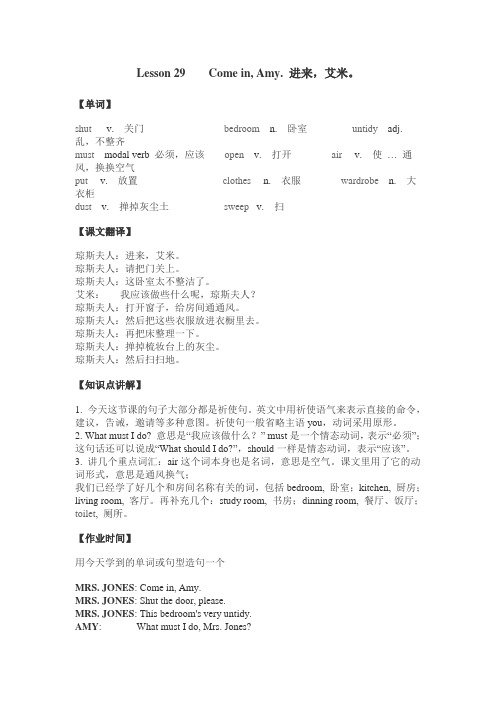
Lesson 29 Come in, Amy. 进来,艾米。
【单词】shut v. 关门bedroom n. 卧室untidy adj. 乱,不整齐must modal verb 必须,应该open v. 打开air v. 使… 通风,换换空气put v. 放置clothes n. 衣服wardrobe n. 大衣柜dust v. 掸掉灰尘土sweep v. 扫【课文翻译】琼斯夫人:进来,艾米。
琼斯夫人:请把门关上。
琼斯夫人:这卧室太不整洁了。
艾米:我应该做些什么呢,琼斯夫人?琼斯夫人:打开窗子,给房间通通风。
琼斯夫人:然后把这些衣服放进衣橱里去。
琼斯夫人:再把床整理一下。
琼斯夫人:掸掉梳妆台上的灰尘。
琼斯夫人:然后扫扫地。
【知识点讲解】1. 今天这节课的句子大部分都是祈使句。
英文中用祈使语气来表示直接的命令,建议,告诫,邀请等多种意图。
祈使句一般省略主语you,动词采用原形。
2. What must I do? 意思是“我应该做什么?” must是一个情态动词,表示“必须”;这句话还可以说成“What should I do?”,should一样是情态动词,表示“应该”。
3. 讲几个重点词汇:air这个词本身也是名词,意思是空气。
课文里用了它的动词形式,意思是通风换气;我们已经学了好几个和房间名称有关的词,包括bedroom, 卧室;kitchen, 厨房;living room, 客厅。
再补充几个:study room, 书房;dinning room, 餐厅、饭厅;toilet, 厕所。
【作业时间】用今天学到的单词或句型造句一个MRS. JONES: Come in, Amy.MRS. JONES: Shut the door, please.MRS. JONES: This bedroom's very untidy.AMY: What must I do, Mrs. Jones?MRS. JONES: Open the window and air the room. MRS. JONES: Then put these clothes in the wardrobe. MRS. JONES: Then make the bed.MRS. JONES: Dust the dressing table.MRS. JONES: Then sweep the floor.。
(完整word版)新概念英语第一册课文word版
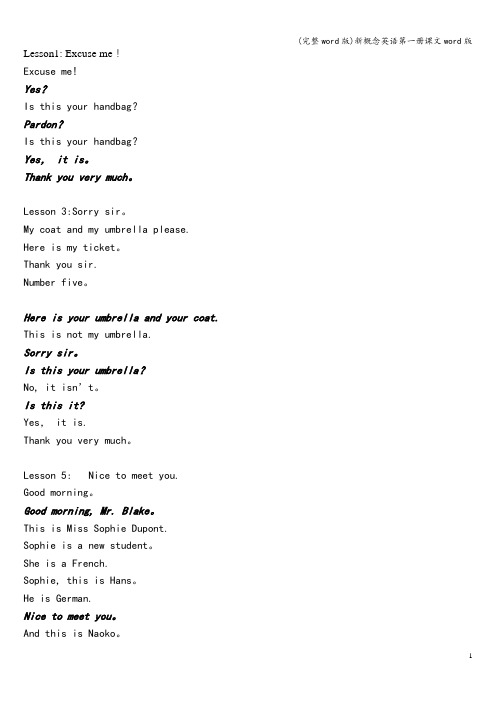
Lesson1: Excuse me!Excuse me!Yes?Is this your handbag?Pardon?Is this your handbag?Yes, it is。
Thank you very much。
Lesson 3:Sorry sir。
My coat and my umbrella please.Here is my ticket。
Thank you sir.Number five。
Here is your umbrella and your coat. This is not my umbrella.Sorry sir。
Is this your umbrella?No, it isn’t。
Is this it?Yes, it is.Thank you very much。
Lesson 5: Nice to meet you.Good morning。
Good morning, Mr. Blake。
This is Miss Sophie Dupont.Sophie is a new student。
She is a French.Sophie, this is Hans。
He is German.Nice to meet you。
And this is Naoko。
She's Japanese.Nice to meet you。
And this is Chang—woo.He's Korean. (朝鲜人)Nice to meet you.And this is Luming.He’s Chinese。
Nice to meet you.And this is Xiaohui.She's Chinese, too.Nice to meet you.Lesson 7: Are you a teacher? I’m a new student.My name’s Robert.Nice to meet you.My name's Sophie。
新概念第一册第29课第30课英语课件Lesson29Lesson30

谢谢观赏
have to. • A: Must I finish the work before six? • B: Yes, you must. • No, you needn’t/don’t have to.
• 2.must 的否认形式must not,表制止、绝对不能。 • You mustn’t get to school late. • You mustn’t smoke in the room.
shelf
cupboard
glass
cup
box
newspaper
book
magazine
knife knives
wardrobe
clothes
end table
dressing table
Lesson 29 Come in, Amy.
How must Amy clean the floor? Sweep the floor.
turn on/turn off light open/shut book
Put some sugar in the coffee. Then put these clothes in the wardrobe.
D
B C
E A E D A BC
1)
Open…and air…
2)
Then put…in…
• 3.must后面动词跟原形。
1.She must be at home. (be)
2.When must Amy swee__p__ the floor? (sweep)
3.— Must they clean the classroom now?
— No, they B
新概念英语第一册Lesson29-30课件
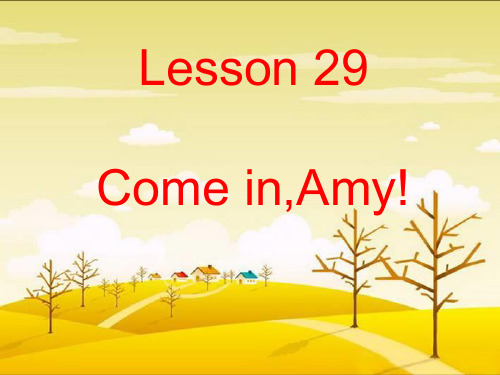
Lesson 29-30 练习题
一. 翻译下列句子。 Make the bed. • 整理床铺。__________________ Turn off the tap. • 关掉水龙头___________________ Take off the hat. • 摘掉帽子。_________________ Don’t come in. • 不要进来。________________ Don’t air the room. • 不要给房间通风。_______________ What must I do? • 我应该做些什么呢?_____________ Sharpen the pencil • 削铅笔.________________ Turn on the lamp. • 打开灯. __________ Open the suitcase. • 打开手提箱_______________ • 穿上你的鞋___________________ Put on your shoes.
1.行为动词原形+其它成分。 Put these clothes in the wardrobe. 2. Be动词+其它成分(形容词、名词或介词短 语等)。 Be careful when crossing the street. 过马路时要小心。 3. Let+宾语+动词原形+其它成分。 Let him go back now.让他现在回去吧。
祈使句
• 祈使句常常是表达说话人对对方的劝告、 叮嘱、请求或命令等。 • 祈使句中一般省略了主语you。 • 在表达请求或劝告时,在祈使句前或句末 可加上please,以使句子的语气更加缓和 或客气。 • Open the window, please. • Come in, please.
新概念英语第一册29课课文原文

新概念英语第一册29课课文原文This is my friend, Robert. He's from Paris, but he speaks English very well. You know, he studied in Londonfor a few years. Robert, could you tell us a bit about your favorite place in Paris?Oh, well, I love the Eiffel Tower. It's such an iconic landmark, and the views from the top are breathtaking. But also, I enjoy walking along the Seine River. It's so romantic, with all the old buildings and bridges.And what about food? I'm sure you have some favorite French dishes.Oh, yes, of course! I love croissants for breakfast, and for dinner, I can't get enough of the French steak and potatoes. But one of my absolute favorites is the cheese. France has the best cheese in the world, don't you think?Absolutely! But I also enjoy the culture and the art.Have you visited any museums in Paris?Yes, I have. The Louvre is incredible. I spent hours there just admiring all the artworks. And also, the Notre-Dame Cathedral is just breathtaking. Its architecture is so beautiful.That sounds like a perfect trip. I'm sure you have many more stories to share about Paris. But before you go, could you tell us what you think about the English people and the culture here?Oh, I think the English are very polite and have a great sense of humor. And the culture is so rich and diverse. I've really.。
- 1、下载文档前请自行甄别文档内容的完整性,平台不提供额外的编辑、内容补充、找答案等附加服务。
- 2、"仅部分预览"的文档,不可在线预览部分如存在完整性等问题,可反馈申请退款(可完整预览的文档不适用该条件!)。
- 3、如文档侵犯您的权益,请联系客服反馈,我们会尽快为您处理(人工客服工作时间:9:00-18:30)。
8.clothes[kləuðz]n.衣服
9.wardrobe['wɔdrəub] n.大衣柜
10.dust[dʌst] v.掸掉灰尘
11.sweep[swi:p] v.扫
击 鼓 传 花 ,争 做 小 老 师
GAME TIME
1.Are you a lazy(懒惰的) kid?
This bedroom's very untidy.
What must I do?
1
Open the window and air the room.
2
put the clothes in the wardrobe
3
make the bed
4
dust the dressing table
5
NOW
This bedroom is very clean.
祈使句: 1.用于表达命令、请求、 劝告、警告、禁止等的句 子叫做祈使句。 2.祈使句最常用于表达命 令。
如:Open the book;Go out;Come in
GAME TIME
抢位置,没抢到位置的学生回答老师所指出的单词
15.put on[put'ɔn]穿上
16.take off脱掉 18.turn off[tə:n ɔf]关(电灯)
4.must[mʌst]modal verb.必须,应该 17.turn on[tə:n ɔn]开(电灯)
5.open['əupən]v.打开
6.air[eəput]v.放置
Lesson 29~30 Come in,Amy! What must i do?
Lycka
1.shut[ʃʌt] v.关门
13.read[ri:d]v.读 14.sharpen['ʃɑ:pən]v.削尖,使锋利
2.bedroom['bedrum, -ru:m]n.卧室
3.untidy[ʌn'taidi]a.乱,不整齐
How must Amy clean the floor?
Mrs. Jones: Come in, Amy. Shut the door, please. This bedroom’s very untidy. Amy: What must I do, Mrs. Jones?
Mrs. Jones: 1.Open the window and air the room. 2.Then put these clothes in the wardrobe. 3.Then make the bed. 4.Dust the dressing table. 5.Then sweep the floor.
GAME TIME
角 色 扮 演
open the window
air the room put the clothes in the wardorbe
make the bed dust the dressing table sweep the floor
must是情态动词,直接加动词原形,若出现must to be done 的话,就是表示被动,意 为“必须被做……” 一.Must表示“必须”。 You must talk to them about their study.你必须同他们谈谈关于他们学习的事。 二.在否定结构中表不许。 You mustn't leave here.你不能离开这儿。 三.表坚定的建议。 You must come and see us as soon as you get to Shanghai.一 到上海你得马上来看我们。 四.表推测,暗含有很大的可能性,用在肯定句。 He must be ill.He looks so pale.他肯 定是病了。他的脸色那么苍白。 注意: may 暗含的可能性较小。must 暗含的可能性较大。否定的猜测用can't The baby can't be ill. He is so active.那宝宝不大可能是病了。他那么活跃。
